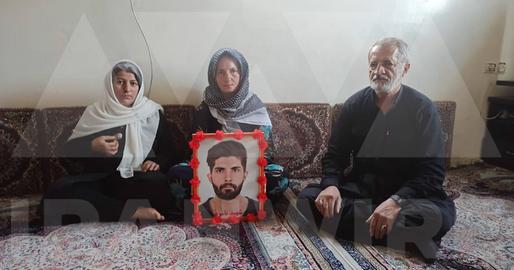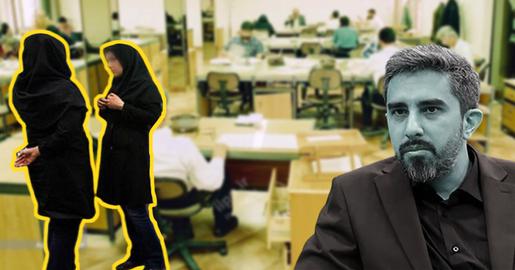
Emad is a 20-year-old conscript from Khorramabad, the capital of the western Iranian province of Lorestan.
Like other young men charged with working at Rajaei Shahr as part of their military service, Emad wears a uniform: black shirt, black trousers, an armband labeled “Prisons Organization’s Protection Unit,” and a pair of uncomfortable faded boots, which he has to endure at all times, except for the few hours when he is asleep.
Most nights Emad has to stand guard at the prison, which is located near Tehran, until 5am. Besides his nightly guard duty, he cleans the grounds, carries tea trays to the employees’ offices and sometimes does their shopping. Essentially, Emad and other soldiers who work at the prison — or who are chained to the facility, in his words — do whatever they are told, and are discouraged from asking any questions.
Akbar is from the same city as Emad. Recently, he was transferred from Kermanshah's Diesel Abad Prison to Rajaei Shahr. He tells me that he will have nightmares about the horrible scenes he has witnessed at that prison for the rest of his life: Torture, soldiers committing suicide, criminal gang leaders who threaten, intimidate and even rape conscripts.
Both Emad and Akbar say that being ordered to transfer prisoners is particularly harrowing. “The only thing I’ve learned at the prison is to make sure I accompany more experienced soldiers when we move the defendants back and forth,” says Akbar. “Of course, I stand guard as well and everybody knows how to clean the prison yard. Yesterday afternoon I was at the guard tower for two hours, I slept four hours and then I was on guard duty again until five in the morning. I was called to attend to the morning ceremonies in the cold weather of five am, as I am every Sunday. After a short parade and reciting parts of the Koran, I went to the inmate dispatch center to move a prisoner to the hospital, accompanied by a guard. Since serving the flag, being an errand boy is the most important profession I’ve had.”
Emad says his experiences transferring prisoners haunt him. “Almost every night I pray that I won’t be on the list for transferring defendants to the court,” he says.
For some conscripts, every day is excruciating, and prison guard officers and judges are part of this experience. “Even drivers of the rented cars who move the defendants and the accompanying soldiers use the time when court is in session to make extra money by taking other passengers places,” says one soldier. “But we have to sit outside the court or the prison.”
A Word of Advice
Occasionally Emad talks to prisoners about their crimes on the way to court. “Sometimes I sympathize with them,” Emad says. “I told somebody accused of rape that he would have been better off if he had raped a virgin, because then he would have had to marry the girl. But since he had raped a married woman he was going to get a death sentence. And once when I was with a political prisoner, I told him he should repent. I told him to think about himself and the future of his wife and his children, not about people who are living their own lives.”
Conscripts work long hours, sometimes without food, and in conditions that are almost always distressing. “It's awful when they send us to the court,” says Emad. Occasionally they get a break at around four pm and can nap or spend a few hours outside the prison. Their favorite pastime is to go to the park and — as Emad puts it — “tease” the girls. But otherwise, it is hard, monotonous, and tiring work.
“We are forced to stay in the corridors until the afternoon, and all the while we are handcuffed to the prisoner. There is no chance of getting lunch or any rest. We are dragged into the stress of the prisoner’s life — the clashes between the two sides and conversations among family members. After all this, we might even have to go on guard duty that night. I would much rather accompany a sick prisoner to the hospital. Then there is more opportunity to rest. We can sit in the hospital’s corridors and when the appointment is over, we take the prisoner back.”
No Connections = Exile
Almost all the conscripts assigned to work in prisons come from remote villages and towns. “They cannot find anybody more helpless than us,” one of them says. “We have no connections so they exile us to prisons.”
Conscripted soldiers eat the same food as the prisoners — if they even get the chance to eat. "Once in a while, a prisoner’s family member might offer us a piece of a cake or a bottle of water," says Emad. "That feels like heaven. But usually, when we return from our duties, nobody has even bothered to save us the poor-quality lunch the prison offers."
According to Emad, the soldiers are lucky if they get a pack of cookies or a bite of bread and cheese — not enough to sustain them for a long day of work. Usually, they are simply too busy to eat, whether they are assigned to guard duty, run errands for prison officials, or sent to the court or the hospital. If a doctor decides that an inmate must be hospitalized, then the accompanying soldier must spend the night at the hospital as well. “Of course, once in a blue moon the guard allows an inmate’s family to order food while he’s at court or in the hospital,” says Emad. “In those instances, they usually buy a meal for the soldier as well — when that happens, we’re overjoyed.”
Nights are also gloomy. “There is a special dormitory for the soldiers,” Emad says. “Lights-out is at 10pm and lasts until 5am. “You wouldn’t believe how enthusiastic my friends are about watching the 40-inch TV the Prisons Organization has recently installed. We watch TV, but the day’s activities are so tiring that before the episode is over, half of the audience is nodding off or already sleep. When I am in the car accompanying an inmate somewhere, I often nod off too. The rules say that a soldier cannot sleep when an inmate is being transferred, but sometimes if I look around, I see everybody in the car is asleep except the driver.”
Emad tells me stories about accompanying defendants to the court. “Sometimes I sympathize with them,” he says. “Once I was telling somebody accused of rape that he would have been better off if he had raped a virgin because then at most he would have had to marry the girl, but since he had raped a married woman he was going to get a death sentence. And once when I was with a political prisoner I told him to repent. I told him to think about himself and the future of his wife and his children, not about people who are living their own lives.”
Generosity beyond the call of duty — and the worst of experiences
But for some prisoners, the kindness of conscripts makes life bearable. Shahab, an inmate at Evin Prison’s Ward 350, says that when he was transferred to a hospital outside the prison because of heart problems, the soldier guarding him bought him newspapers everyday with his own money.
“A. Bazrafkan” has also been assigned to Evin as part of his mandatory military service. He says he has accompanied several Green Movement defendants to the court and that he supported Mir Hossein Mousavi [during the 2009 presidential election] and had taken part in the demonstrations as a teenager.
For some conscripts, every day is excruciating, and prison guard officers and judges are part of this experience. “Even drivers of the rented cars who move the defendants and the accompanying soldiers use the time when court is in session to make extra money by taking other passengers places,” says one soldier. “But we have to sit outside the court or the prison.”
Conscripts are supposed to have five days off each month, but in reality, at best it is 10 days off every three months. If conscripts go AWOL, they face a few days’ solitary confinement as punishment. The same is true if they disobey orders from their superiors.
To top it all off, the pay is pitiful. “This month they deposited 80,000 tomans [around $27] in our accounts,” Emad says. “But most months it is much less, 50 or 60,000 tomans. It depends on how generous they feel. There is no official amount.”
Several conscripts say the worst part is witnessing executions. Ali Akbar is assigned to Ghezel Hesar Prison. His worst memory is from the execution hall at the prison, which has left him dazed and shattered. “I had gone to the execution hall to do a chore for my commander,” he says. “I was about to leave when the doors were locked. I had to watch the executions. They put the nooses around the necks of the three convicts and the hydraulic pedestal on which they were standing was suddenly lowered. The 10 minutes that the three convicts fought against death was the most horrifying experience I have had during my service. I will not forget those 10 minutes as long as I live.”

























comments